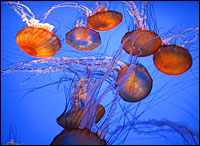The natural cycle of Mediterranean jellyfish populations is to swell every 12 years, plateau for four to six years, then subside. But massive groups of gelatinous jellies have been showing up for the past eight years, and they show no sign of flagging. In fact, jellies are proliferating worldwide, and that makes scientists nervous. “Jellyfish are an excellent bellwether for the environment,” says oceanographer Jacqueline Goy. “The more jellyfish, the stronger the signal that something has changed.” That “something” is, no doubt, an increase in human meddling: as humans pull tons of fish out of the world’s seas, jellyfish move in; as human activity heats the climate, jellyfish take advantage of warmer waters to procreate like squishy, brainless rabbits.


